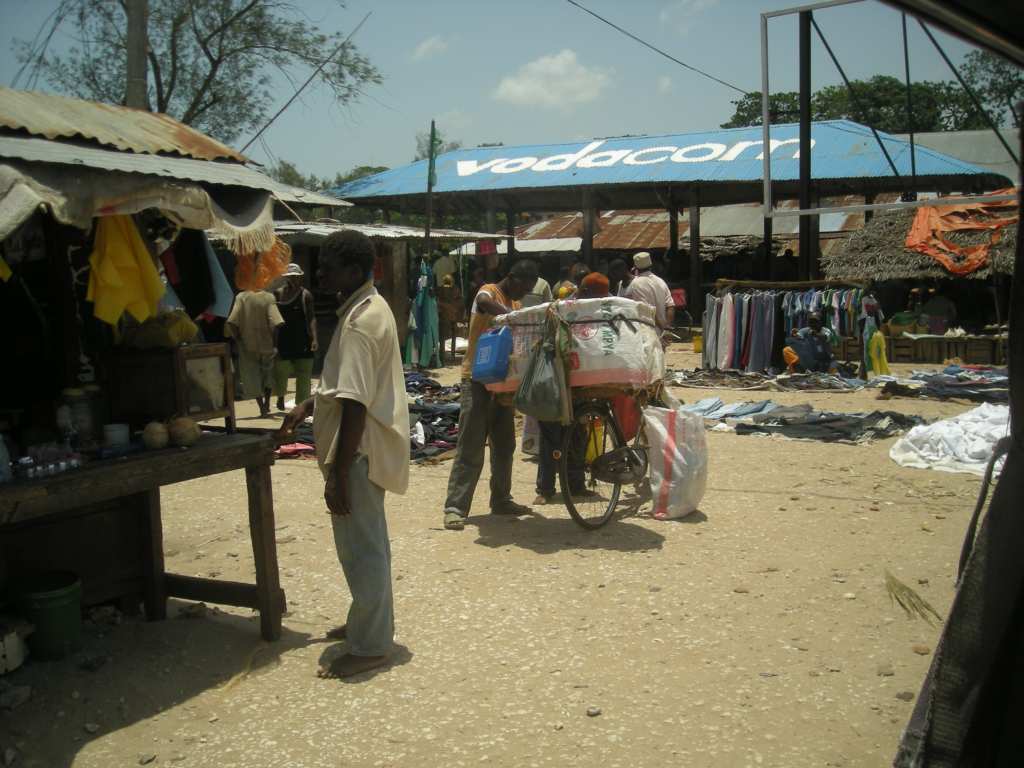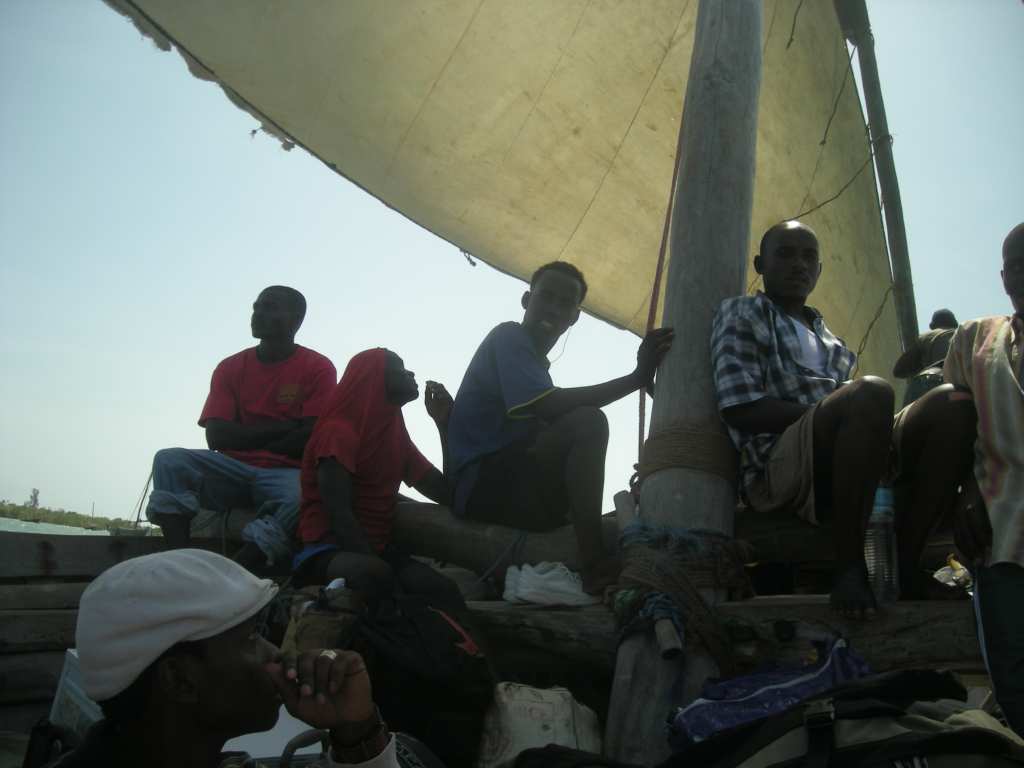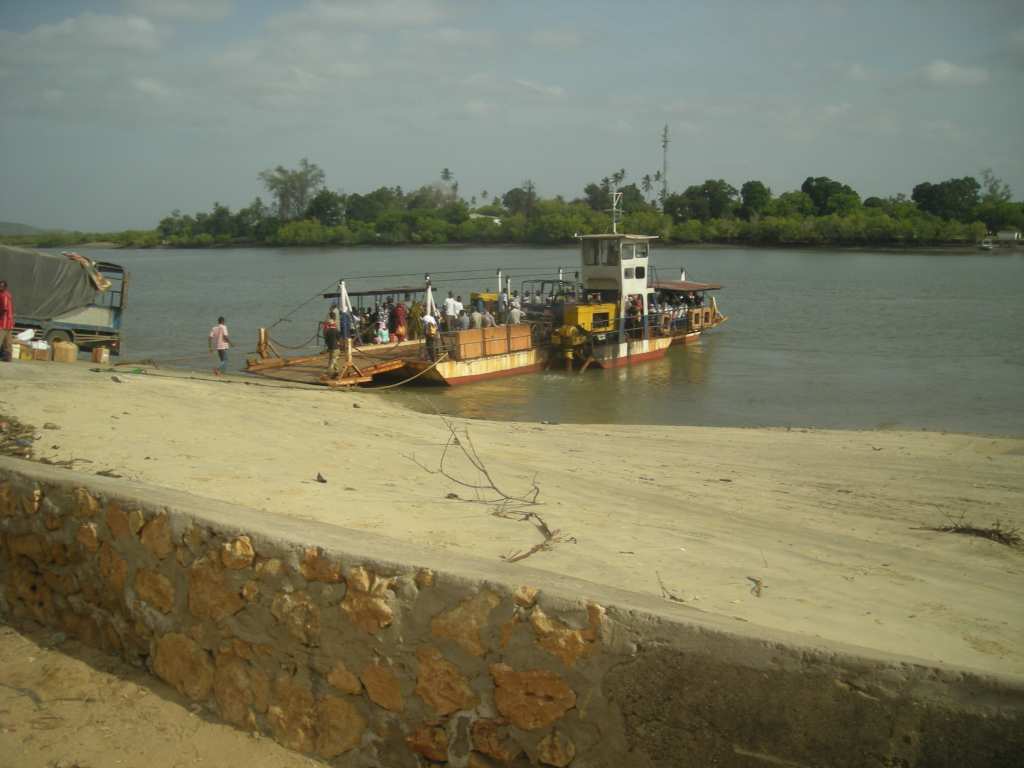Our goal was to leave Zanzibar towards a place close to Tanga by dhow, the ancient small wooden ships with single sail. There is dhow port about 2 hours drive north from Stone town, where we got after visiting the ruins of the sultans palace. Silvio, who speaks some Kiswaheli went off with the driver to find the dhow captain. He comes back about half an hour later, slightly pissed off with the price that guy asked for. And he has to go to the Immigration officer with our passports before we leave. The Immigration officer sits in a small room in a shed that is used by carpenters and trades at the same time. No official signs visible at all. We’re asked to write a piece of paper we would not sue the skipper in case of any accidents. And we are advised from the young fellow dealing with us there that the ticket price is way less. Finally, we pay some 15 thousand Schilling. The boat would sail straight to Tanga, a quiet and nice harbor town close to Kenya. We are happy, this might save us one day awesome bus ride on bumpy dirt roads. We board the less than 10 meter long boat after lunch time, and wait about an hour in the burning sun for the other passengers arrive with even smaller boats. There are about 4 dozen of people on the boat. No roof. Man are sitting on the reeling and in the elevated bug and end, young and old women with babies would squat in the middle, behind a large pile of luggage. Then the anchor is raised, the sail is hissed, and the boat quickly departs. In the bay, waves are small. After half an hour, we reach the open sea, and the waves get bigger, perhaps 2 meters high. The boat climbs on top of the waves, and falls down again. Sometimes, a small shower gets into the boat. A little later, the first passengers start puking. Some would have a plastic bag handy. Otherwise the lunch just ends up on the floor - or on the kid sitting on the lap of the poor victim of the sea sickness. The more adjusted men smile, and two skilled men start to scoop out the water from the bottom of the boat with a bucket while the boat is rolling from wave to wave. Flying fishes beside us, and suddenly there is no coast visible anymore. The skipper on the oar does neither have a GPS nor a compass, he’s only navigating by the sun and the wind, until the coast of the mainland becomes available again. Dolphins jump beside the boat. We approach a small village that is certainly not Tanga by sunset. The first bus to Tanga leaves in the morning, we have to stay in the only guest- or whorehouse. No reason to complain, we were just misinformed. We have fatty Chipsy Maiai, the infamous Tanzanian potato omelet for diner, and screams at night from the neighboring rooms.



What is said to be a two hours bus ride turns out funny. At first, we help push-starting the big rotten vehicle at a random time. After all seats are occupied, two dozen of school kids in uniforms are squeezed into the middle of the bus, while the driver desperately tries to keep the engine alive. Roaring and with sliding clutch the bus departs in walking pace, stops every here and there to let a few people off or on. Finally, the kids are released from the bus ride and the crowd of yellow-white shirts and blue trousers and skirts heads for the nearby school. We hardly seem to gain mileage that way, yet get a good impression what life must be like out here beside the tourist track, in the small settlements of traditional clay houses and new style one storey stone houses. A lot of them have no roof, and man high trees inside. We pass by sisal plantations, dry bush land and vivid forests from time to time. In Pangani we have to cross a river by an old small ferry. Once, so it is said, there was money allocated by the government to build a bridge here. However, for some funny reason the locals decided not to have the bridge. And the ferryman smiles in the burning sun. And our bus breaks apart again, coming over with the next ferry. After approximately 5 hours of bus torture, we reach the outskirt of Tanga. Plopp – one tire is flat. The driver decides to keep going. We honor his decision; we’re keen to finally reach a comfortable place again.
Tanga - beers in the hotel to swallow the past hours. We meet a German development aid worker in the hospital and have more beers for sunset on the deserted roof of a bar with a lovely view into the bay and the uninhabited Toten island. Gerd tells us some stuff about Tanga’s colonial history and his abidance and work here. Two locals sit on the remaining table behind us and listen to Bob Marley on a portable Radio. We meet again in the restaurant of our hotel for diner. An old German is there as well and his friends, a local that looks like the young Julius Nyere, the famous first president of Tanzania, as the German states. The German used to teach in Zanzibar already 20 years ago, being sent from former Eastern Germany. The young local is building up a museum about the history of Tanga, and the German tries to support him. We hear a lot about the astonishing history of Tanga, and get a good hint to go to the Usambara mountains next.